Spring Term AY2025
 photo: Nagasaki Atomic Bomb Exhibition at International Conference Room, Kiyoshi Togasaki Memorial Dialogue House, ICU
photo: Nagasaki Atomic Bomb Exhibition at International Conference Room, Kiyoshi Togasaki Memorial Dialogue House, ICU
As cherry blossoms bloomed, the spring term began with a sense of anticipation and new possibilities. Sixty-eight students enrolled in the general education course, "Service-Learning," stepped into the communities, engaging in service activities that provided valuable insights and meaningful learning experiences.
This summer, 58 students will travel abroad, while 7 students will participate in domestic programs, each dedicating 30 days to service activities.
How does the learning gained through engagement with the community and society influence students' career paths, values, actions, and motivation?
In this issue, we focus on the reflections of past Service-Learning (SL) participants, exploring how experiences from SL have carried over into their current lives.
Service-learning is not merely a fleeting experience—it is a meaningful step toward the future. We hope this newsletter helps you appreciate the enduring significance of these experiences.
Topic
- The Student-Organized Project "Nagasaki Atomic Bomb Exhibition"
- The Student-Organized Peace Event, "Echoing the Voice of Nagasaki"
Contents
- Event Hosted by Participants of the Nagasaki Service-Learning Program
- The Paths Our Graduates Have Taken
- Learning Never Ends — What Service-Learning Leaves Behind in a Lifetime
- Message from the Director of SLC
- Editor's note
Moving Forward: What the Nagasaki Service-Learning Experience Led to
On Thursday, May 8, 2025, the event "Echoing the Voice of Nagasaki" was held, organized by students who participated in the service-learning program in Nagasaki and ICU students from Nagasaki.
Three students who participated in the service-learning program in Nagasaki and organized this event shared their thoughts.
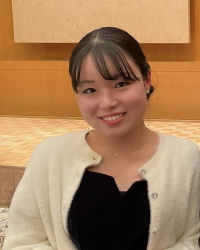
Rise SAIKI
Nagasaki Foundation for the Promotion of Peace and Nagasaki University AY2024
Service-learning is not only learning from service activities, but also putting into practice what we can do. I spent 30 days in Nagasaki keeping this in mind, but I regret that I was unable to contribute and even find anything I could do to bring about peace. That’s why I continued finding what I could do even after the program ended, which eventually led to the realization of this project. Because I went to Nagasaki through service-learning, I was encouraged to think about social issues from the perspective of what I personally could do. Being able to carry out this project gave me confidence that - even in the face of something as immense as achieving peace - there is still something I can do. This has become a truly meaningful and empowering experience for me.
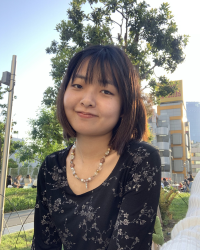
Hanna YOSHIDA
Nagasaki Foundation for the Promotion of Peace and Nagasaki University AY2024
Service-learning had such a profound impact on me that I found myself continuing to reflect on the issues even after the program ended. In Nagasaki, with the support of many people, I was able to gain deep insights into the city’s experience as an atomic-bombed site, the inhumanity of nuclear weapons, and the theoretical frameworks for nuclear abolition. When planning this event, I strongly felt that it would be a waste to keep this learning only for us. After returning to Tokyo, I went with Saiki-san to see a documentary about atomic bomb survivors who traveled to the United States to share their experiences. One particularly striking scene showed an elderly survivor struggling with the challenges of sharing their stories across borders, and this reinforced our desire to make the most of ICU’s internationally diverse environment, which led us to organize this event. In order to reach as many people from different backgrounds as possible, we made several efforts, such as asking students studying interpretation at ICU to provide simultaneous interpretation and preparing all materials in a full bilingual format. I would be happy if even one more person came to see that nuclear issues are not just problems for the bombed areas, but issues that concern us all.
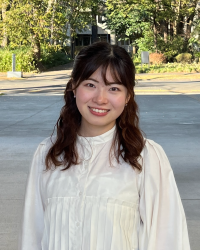
Ririko SHISHINO
Nagasaki Foundation for the Promotion of Peace and Nagasaki University AY2022
I encountered diverse cultures, people, and memories in Nagasaki. The experiences I gained over the 30 days there were significant, and I wanted to keep in contact with Nagasaki after the program ended. In order to spread discussions about peace and nuclear weapons, we, the SL students, must not stop talking about these issues. Two junior students said they wanted to bring a project related to Nagasaki, and I became one of the circle of peace.
On May 8, we invited Mr. Mise, turning 90, and Professor Yoshida from Nagasaki University to ICU, and together with many students from diverse backgrounds, we had the opportunity to think about peace and atomic bombs. On the day of the event, I truly felt the circle of peace we had built spreading as I saw people actively participating. It made me truly happy.
This year marks 80 years since the atomic bombing, and I believe it is a miracle that Japan has not experienced war during this time. As a citizen living in the present, I will continue to contribute toward building a peaceful society, even after graduating from ICU.
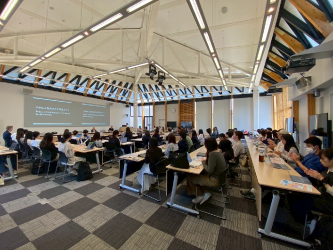
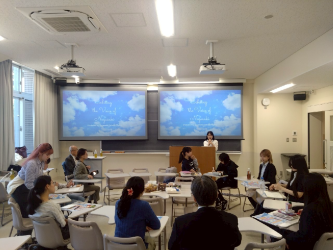
|
The Paths Our Graduates Have Taken
Students who participated in the Service-Learning Program are now thriving in their respective careers after graduation. How have the challenges and lessons they encountered during their student years influenced their current work and way of life? In this article, we introduce the voices of two alumni who experienced SL.
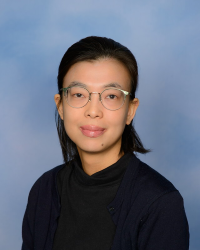
Teacher, Tokyo International School
President, YWCA of Japan
Ms. Sayaka HIGUCHI
The Amity Foundation, AY2008
In March 2008, I spent about three weeks engaged in service activities in Nanjing, China, working with the Amity Foundation and the John Rabe House. The theme of our activities was reconciliation between Japan and China. During the program, I engaged in dialogue with members from ICU and other multinational participants, discussing perspectives on history and what actions we should take moving forward. Even after returning to Japan, I continued to be involved in service-learning throughout my four years at ICU, including helping host students from Nanjing. These experiences led me to choose peace education as the theme of my undergraduate thesis, and I continued my research in graduate school.
Currently, I work as a Japanese language (kokugo) teacher at an international school. I still consider peace education—based on the idea of recognizing history and overcoming it to build a future-oriented world—to be my life’s work. In recent years, I’ve also been deeply interested in how service-learning can be implemented within public education. At my current school, I’ve come to be seen as someone to consult about service-learning, which I believe stems from my experiences at ICU.
Nearly 20 years have passed since my first service activities, but those experiences continue to guide me on my path, and I still feel their influence today. I aim to keep learning and improving, fueled by those experiences.
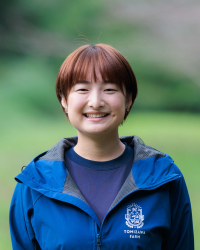
Farm Manager, Facilities Management Group, International Christian University
Ms. Chigusa HORIUCHI
Japan Summer Service-Learning (JSSL) AY2021
In the summer of 2021, I participated in JSSL and engaged in service activities in two locations: Mitaka City in Tokyo and Tenryu Village in Nagano Prefecture. Even now, four years later, I strongly feel that the one month I spent in JSSL was a transformative experience that significantly influenced my values and future path.
Having grown up in a regional city, staying in Tenryu Village—a community of about 1,000 people—was a completely new experience for me. In the village, residents would bring us vegetables they had harvested from their fields, and we were often invited to join communal meals. These warm exchanges through food were deeply rooted in daily life. Especially during the COVID-19 pandemic, when human interaction was limited, the time spent sharing meals together became a precious and memorable experience.
In contrast, in Mitaka City, I helped local farmers engaged in urban agriculture and participated in international exchange classes at a local elementary school. Through these diverse activities, I developed a strong interest in “food” and “community engagement.” This interest led me to pursue long-term stays in other regions and assist nearby farmers during my student years.
I still keep in touch with the people I met in Mitaka and Tenryu Village. Now, a year after graduating from university, I work at ICU as a staff member involved in the “Farm Project,” which provides students with opportunities to engage with nature and food. I hope to leverage the connections I’ve built with local communities to create new encounters and learning experiences through food, this time with ICU as the base.
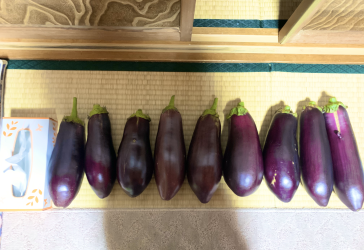 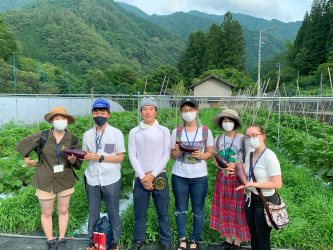
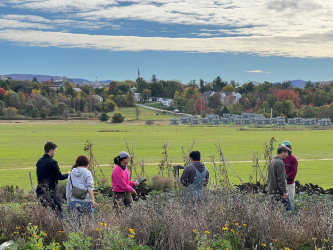
|
Learning Never Ends — What Service-Learning Leaves Behind in a Lifetime
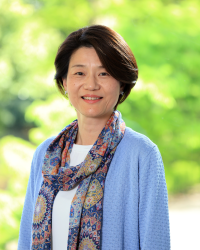
Atsuko KURONUMA
Assistant Professor by Special Appointment in Education
Assistant Director of Service-Learning Center
"My Service-Learning is just beginning."
This memorable statement, made by a graduating student on commencement day, was later featured in the 2011 publication "Service-Learning and Its Long-Term Implications." For this student, the experience and insights gained through service-learning lived on, serving as a source of inquiry and principle well beyond graduation.
An SLC alumni survey conducted in 2009 revealed that many respondents felt service-learning significantly impacted their personal growth, career choices, and interest in social issues. Encounters with people and service experiences in the respective communities were often cited as the most memorable. Notably, around 40% of alumni reported recognizing differences between themselves and others during their service and said they were able to view these differences positively, suggesting a transformation in their values and relationships.
Although service-learning is part of the formal curriculum, its influence extends far beyond credit fulfillment. It shapes how students relate to others, view society, and envision their future paths. Service-learning can become a lifelong process of embracing inquiry and engaging responsively with others, as captured in the phrase "just beginning."
Message from the Director of SLC
Etsuko KATO
Professor, Cultural Anthropology
Director, Service-Learning Center
Starting this academic year, one academic term at ICU has been shortened from 10 weeks to 9, which has posed some challenges for students enrolled in the general education course "Service-Learning (SL)." The time allocated for the 18-hour off-campus service activities, including negotiations with host organizations, scheduling activity dates and times, conducting activities, and reflection, has been reduced by one week compared to last year. While one academic term at ICU is often described as a “sprint” for being extremely busy, and this new approach has made it more like measuring a record in 90 meters instead of 100. This “short-distance run” approach may foster quick thinking and explosive energy, but it could also lead to a mindset where students simply tackle whatever comes their way without deeper consideration. Service, by its nature, is a "long-distance run" that requires time to build trust, listen to the needs of others, and act thoughtfully. It is not about calculating efficiency or cost-effectiveness. Therefore, this change presents a challenge for SL as a course. Please keep this in mind and strive for "depth" in your service-learning experience.
Editor's note
![]()
This spring, I witnessed how sustaining partnerships beyond the classroom enabled students to develop global citizenship and take meaningful action. The Nagasaki exhibition and P&R Week reaffirmed the transformative potential of service-learning grounded in mutual relationships on and off campus. These experiences reminded me of the power and responsibility that service-learning carries.
![]() I joined the SL Center as a new member in April. I am impressed by the many wonderful learning experiences that SL provides to participants through student-run events. I hope to contribute to the continued development of the SL programs at ICU.
I joined the SL Center as a new member in April. I am impressed by the many wonderful learning experiences that SL provides to participants through student-run events. I hope to contribute to the continued development of the SL programs at ICU.
![]() In the spring term, events planned by students with SL experience were held, making for a busy yet fulfilling time. Their strong desire to shape and share their thoughts on peace widely was truly inspiring, and I hope they will continue to carry that energy forward and thrive in their future endeavors.
In the spring term, events planned by students with SL experience were held, making for a busy yet fulfilling time. Their strong desire to shape and share their thoughts on peace widely was truly inspiring, and I hope they will continue to carry that energy forward and thrive in their future endeavors.
![]() During the Spring term, the Service-Learning Center was reorganized under the Student Services Division, enhancing collaboration with other administrative departments. We are grateful for the challenges and learning opportunities in this new environment and remain committed to supporting our students.
During the Spring term, the Service-Learning Center was reorganized under the Student Services Division, enhancing collaboration with other administrative departments. We are grateful for the challenges and learning opportunities in this new environment and remain committed to supporting our students.
![]() This spring, seeing students hanging out around the newly renovated Honkan and the lawn—with no masks in sight—really made me feel like campus life was finally back to how it was before the COVID-19 pandemic. It’s been five years since then, and I am once again reminded of the importance of staying mindful in our daily lives.
This spring, seeing students hanging out around the newly renovated Honkan and the lawn—with no masks in sight—really made me feel like campus life was finally back to how it was before the COVID-19 pandemic. It’s been five years since then, and I am once again reminded of the importance of staying mindful in our daily lives.

